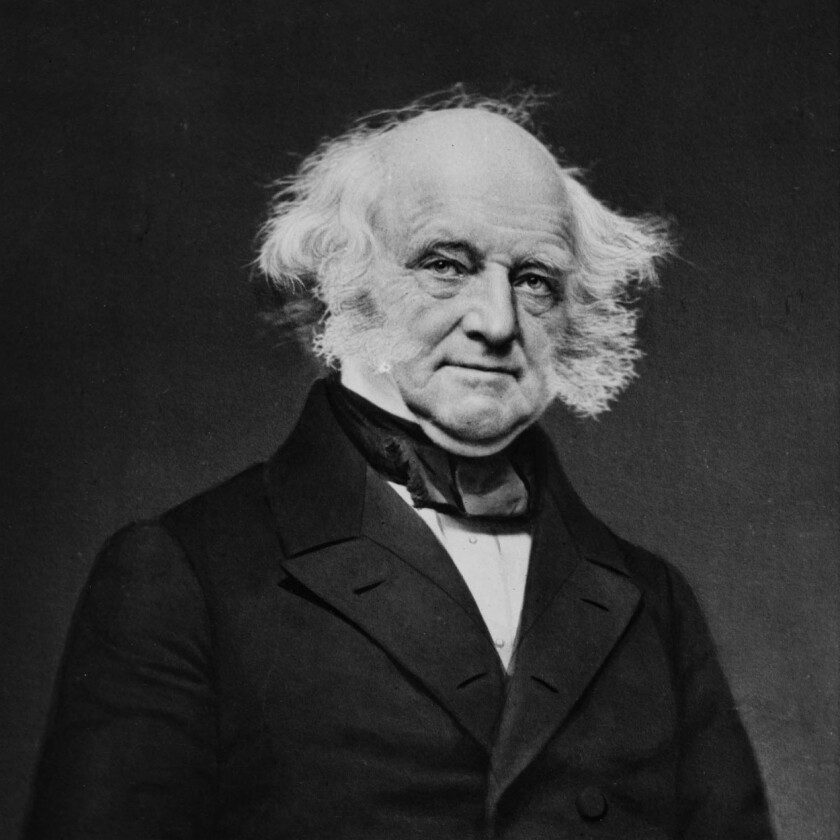Party politics have always been controversial, but they have evolved into an unattractive piece of American democracy in recent decades. They have helped fuel fires of polarization and choked down legislative efforts at all levels of government. As a result, political parties themselves are under assault. Conservative journalist and historian Jay Cost, however, believes these efforts are misguided. He argues that rather than get rid of parties, we need to restore them to well-functioning entities that contribute to effective governance.

In a wide-ranging interview with Governing Editor-at-Large Clay Jenkinson, Cost shared his ideas on parties, primaries, the American presidency, and how the country has lost touch with some of the things - wisdom, virtue, competence - that make self-government work.
The following interview has been edited for clarity and length.
Jay Cost: Spoiled Rotten was the first book I wrote. It was a critical history of the Democratic Party, but from an unexpected angle. My claim was that the party used to do a reasonably good job of balancing the factions within the party with a concern for the general well-being of the country. The argument I made was that those factions have become so numerous and their claims so overwhelming that the party could no longer do both. That book got me thinking about the difference between what's in the public interest and what's in the interests of factions, launching me on the intellectual journey that I've been on since.

Governing: As a country, where are we now?
Jay Cost: Our politics are very polarized. They’re biased in two ways. My second book, A Republic No More, was an investigation into the extent to which business interests and the wealthy are able to dominate public policy for their own interests. It’s so bad that people don't even know or understand that it's a problem anymore. If you go back to the early 1900s, at least Lincoln Steffens and David Graham Phillips were sounding the warning bells about politicians in bed with big business and interest groups. There's nothing like that now. The second problem is that the financing of politics and the marketplace of ideas is increasingly dominated by ideological extremists on both sides of the aisle, people who have a false sense of what politics is supposed to be. Their whole idea is to defeat their enemies and get everything they want. When you take these two factors together, you have a recipe for severe dysfunction.
Governing: So where do we start?

The primary system is an unmitigated disaster. Our campaign finance regime is fanciful at best. One of the worst pieces of legislation in my adult lifetime was McCain-Feingold. Before McCain-Feingold, money flowed through the parties. They regulated where it went. After McCain-Feingold, the money went everywhere. Now you get candidates preening on CSPAN for small-dollar donations, saying ridiculous things on Twitter for small-dollar donations, and sucking up to tech billionaires for super PAC money. Parties function in a democracy as a cartel to limit the range of options placed before the voters, so that voters can make actual choices about policies. We’ve never owned up to the fact that this can only be done through the parties. We're deluding ourselves in the same way that George Washington did, thinking that parties are an aberration, that party politics are bad and grubby. They are, but democracy is grubby, so parties are necessary.
Governing: In what way are primaries a disaster?
Jay Cost: They're based on the false premise that an average voter can differentiate qualities between candidates within the same parties. A good average voter is somebody who reads the newspaper and makes a point to vote, but who has a job and kids and a life. It’s somebody who wants to do their civic duty but has to balance and measure that against their other obligations. If you don't know anything about a candidate, you risk casting a vote that’s against your interest. Party labels serve as a branding device. If you know a little bit about what the party stands for, even if you've never seen the names on the ballot, you can still navigate the choices. The original conceit of party primaries was to take it out of the hands of party bosses and let the average American pick the candidates. But it's clear now that this is asking too much of voters. You need public input into party decision-making, but an open process is not a good solution.
Governing: This seems opposed to the Jeffersonian notion that the citizenry possesses a baseline of common sense and can be educated and trusted to govern themselves.

Governing: There’s a lot of anger in the country. How did Trump discern it and leash it for his own purposes?
Jay Cost: The great irony of Donald Trump, and it's something that the elite media hasn't picked up on, is that he's a fabulist, a liar, but he's also weirdly, refreshingly honest in the way he talks to people. It's interesting to me the extent to which the media obsessed over the number of lies that Trump told, because I tend to think that everything about political campaigns is a lie. It's all workshopped, with strategists and focus groups and polling. Politicians give speeches they don't write. So what's a lie and what's the truth, somebody giving a speech he didn't write, or Donald Trump saying what’s actually on his mind?
Governing: When does the anger begin to dissipate?
Jay Cost: I don't know. It remains exploitable, and there are candidates on both sides that are looking to exploit it. There's a lot of rage on the left-hand side of the country too. It's interesting that a lot of times the rage is very similar. The populist right and the populist left are often saying very similar things even though their solutions may be different. The Populist movement was built on long-standing rage after the civil war. It was William Jennings Bryan who was able to focus that anger and direct it in a certain way. Trump was similar to Bryan, at least in his ability to take long-simmering and vaguely inchoate rage and say, “This is what you're angry about.” A lot of the candidates running on the Republican side are going to take this angle, but it’s an insane notion. You harness all this rage and then you get into Washington, and you've turned one-half of the country against the other half.
This may cause me to come across as more left wing maybe than I actually am, but there is a chart that tracks changes in real wage growth over the last 50 years against the real value of the Dow Jones. Starting in the 1980s, those two went in opposite directions. As long as that remains the case and people are aware that those at the top are doing better than they are, it’s going to rub people the wrong way. It isn’t that Americans begrudge the rich their money. But if I'm making 2 percent more per year and a Wall Street trader is making 20 percent more per year, that's going to agitate me, especially when that 20 percent difference is plowed into the political process to make sure that their returns continue.
Governing: Madison believed that the system only works if there is some kind of a commonwealth spirit of compromise. When you look today at the infrastructure bill, can there be a serious American who doesn't realize that we need to invest greatly in our infrastructure? Yet it became a partisan farce, with Republicans voting against the interests of their constituents because they don’t want to give the Democrats a victory. If Madison were here, wouldn’t he be saying that the system has broken down?
Jay Cost: He would. I have two things that I can always rant about. One of them is the decline of the parties. The other is the rise of the American presidency to be the dominant force in American politics. This has really distorted our politics. National politics is a good and necessary thing. But the presidency has exercised such an overwhelming influence on the psychology of the American people that everything has been nationalized. A great example is Republicans across the country high-fiving over the victory of Glenn Youngkin in Virginia. I'm from Pennsylvania, so why should I care? And it's not just that. State legislatives correlate very well with the status of the president. If the president is doing well, his party does very well in state legislative elections. If he's doing poorly, his party does poorly. Why does one have anything to do with the other?
I agree that Congress is dysfunctional, but we often misunderstand the nature of its dysfunction. Why are its members voting against this bill that is good for their districts? Is it because they're not doing right by their districts? Yes. But is it also because their primary voters and their constituents, especially if it's a majority Republican district, don't want them supporting the president? Members of Congress are afraid that voting for this thing will hurt their re-election chances, again because we're so transfixed by the presidency.
Governing: So how do we build modest trust and integrity in our national systems?
Jay Cost: Our managerial class has been grossly incompetent. Where is an Albert Gallatin or a Henry Clay or a Thomas Jefferson? Where's John Jay, expertly playing the French off of the British. Where are these people? It isn’t that our leadership class is lacking in intelligence. They're very clever, but they lack wisdom, and they lack virtue. So much of our politics is dominated by those sorts of people. Maybe it's not something that we can fix without some sort of exogenous event. The United States has enormous capability for ignoring problems until they can't be ignored. Maybe this will be another of those things where fate or Providence or karma or God or just dumb luck comes and slaps us across the face. Some shock to remind us that self-government actually requires work from the average voter as well as from the people who claim the mantle of leadership. And that leadership has to be virtuous and wise.
You can also hear more of Clay Jenkinson’s views on American history and the humanities on his long-running nationally syndicated public radio program and podcast, The Thomas Jefferson Hour. He is also a frequent contributor to the Governing podcast, The Future in Context. Clay’s most recent book, The Language of Cottonwoods: Essays on the Future of North Dakota, is available through Amazon, Barnes and Noble and your local independent book seller. Clay welcomes your comments and critiques of his essays and interviews. You can reach him directly by writing cjenkinson@governing.com or tweeting @ClayJenkinson.













